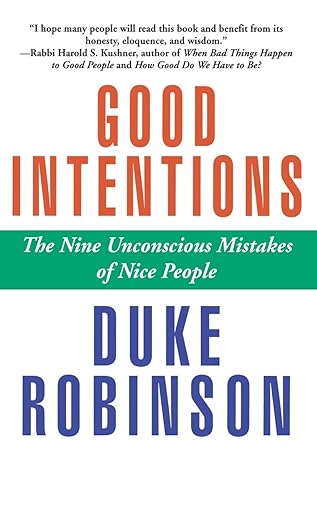
I can’t believe it’s been nearly 28 years since I picked up a book by Duke Robinson titled: Good Intentions: The Nine Unconscious Mistakes of Nice People.

I read it and benefited from it. A lot. And so I pulled it out about once a year for several years after that. I kept reading it until I felt I’d really absorbed and activated the good advice it contains.
This week I found myself looking for that particular book among my shelves. Not only do I need a refresher course on living life as a chronically nice person, I have a few loved ones that could probably use it as well.
Sadly, somewhere in the decades since then, it must not have survived the cut amid one of my periodic cullings of the book collection. There are only so many bookshelves in the house my gifted interior decorator wife will tolerate. (True story: I once donated eleven boxes of books to a women’s prison. And that was after just one “cull.”)
Don’t get me wrong. I love being a nice person. I have every intention of remaining one. Frankly I don’t think I have much choice. I’m hard-wired for niceness. And on top of that, there’s that whole Fruit of the Spirit thing that we Christians have going on if we cooperate with Him. Organically bearing the fruit of love, kindess, gentleness, patience, and the others just tends to pile niceness on top of niceness.
Besides, there are already too many “not nice” people in world. And as some wise, ancient philospher and bumper-sticker-maker once observed:
“Mean people suck.”
No, all I wanted was to stop making those “unconscious mistakes” that we nice people are so prone to making. And when I read the book, I saw that I was consistently guilty of making five or six of the nine.
So . . . what are those nine “unconscious mistakes” you’re surely wondering. Well since the book has been out of print for a couple of decades, I suppose I’m on solid ground giving you a summary of them. Behold . . .
Duke Robinson’s Nine Unconscious Mistakes of Nice People:
- Trying to Be Perfect: An incessant drive for flawlessness that leads to burnout and dissatisfaction.
- Taking on Too Much: Overcommitting to responsibilities, often at the expense of one’s own well-being.
- Not Saying What They Want: Suppressing personal desires to avoid conflict or displeasing others.
- Suppressing Anger: Avoiding the expression of anger, which can result in internal resentment.
- Reasoning with Irrationality: Attempting to use logic with unreasonable individuals, leading to frustration.
- Telling Little Lies: Using minor falsehoods to maintain harmony, which can erode trust over time.
- Giving Unwanted Advice: Offering guidance without solicitation, potentially undermining others’ autonomy.
- Rescuing Others: Intervening to help others avoid consequences, which may hinder their personal growth.
- Protecting Those in Grief: Shielding grieving individuals from pain, possibly impeding their healing process.
It’s possible that the word “boundaries” comes up a time or two in his book. In fact, what most of us chronically nice people need desperately are the two “Bs” . . . Boundaries and a Backbone.
None of the advice or techniques for correcting these mistakes requires becoming a jerk or even being perceived as one (a nice person’s worst fear.) But it does require some self-awareness and a willingness to say what you want, calmly express what you felt, and, occasionally, kindly but firmly telling people you love, “no.”
When we fail life’s “boundaries and backbone” tests, we end up silently resenting others and then feeling guilty about feeling the resentment. And then can resent the other person even more for causing us to to feel that yucky guilt. That’s not fair to anyone. No one, and least no one decent and worth your precious time, wants to be resented. We actually do them and ourselves a dissevervice when we make that common nice-person mistake.
Like I said, I’m due for a refresher course. Now off to the used book sites to find a copy.


You’re reading my mail here!